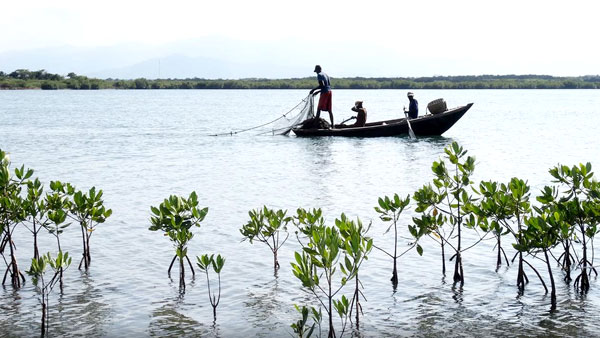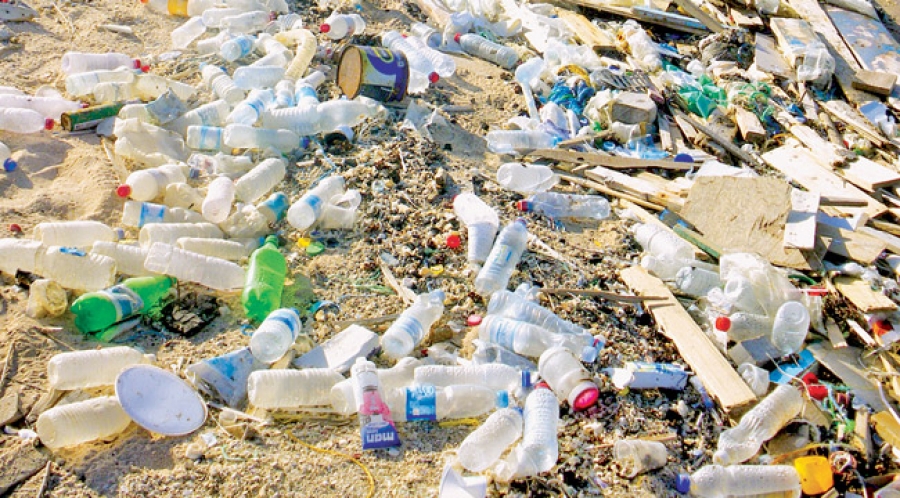
Agree to be Green
As many as 195 States were parties to the discussions in Paris on the COP 21 Agreement which was accepted in general by consensus. The Agreement will be deposited at the UN in New York and opened for one year for signature on April 22, 2016–Mother Earth Day. The Agreement will enter into force after 55 countries that account for at least 55% of global emissions have deposited their instruments of ratification
It was recently reported that Cabinet approval had been given for Science, Technology and Research Minister Susil Premajayantha to sign on behalf of the Sri Lankan government the Paris Agreement adopted by the Conference of The Parties (COP 21) to The United Nations Framework Convention on Climate Change UNFCCC) held in September 2015. It is understood that Cabinet approval was granted not for the mere signature of the treaty (which is not sufficient for the treaty to be applicable to Sri Lanka) but for the ratification of this Agreement by which Sri Lanka will be bound by the principles enunciated in the Agreement. Minister Premajayantha is to participate in the high level signature ceremony on April 22 at The Headquarters of the United Nations in New York.
As many as 195 States were parties to the discussions in Paris on the COP 21 Agreement which was accepted in general by consensus. The Agreement will be deposited at the UN in New York and opened for one year for signature on April 22, 2016–Mother Earth Day.
The Agreement will enter into force after 55 countries that account for at least 55% of global emissions have deposited their instruments of ratification. The overall aim of the Agreement is to maintain a global temperature rise in the 21st century to well below 2 degrees Celsius and to strive to limit the temperature increase even further to 1.5 degrees Celsius above pre-industrial levels, the lower level recognized as a buffer against worst case scenario impacts of climate change. Another important goal of the Agreement is to strengthen the capacity of States to effectively address and mitigate the impacts of climate change.
Article 2 of the Agreement stipulates that the Agreement aims to strengthen the global response to the threat of climate change, in the context of sustainable development and efforts to eradicate poverty, including by: holding the increase in the global average temperature to well below 2 °C above pre-industrial levels and to pursue efforts to limit the temperature increase to 1.5 °C above pre-industrial levels, recognizing that this would significantly reduce the risks and impacts of climate change; increasing the ability to adapt to the adverse impacts of climate change and foster climate resilience and low greenhouse gas emissions development, in a manner that does not threaten food production; and making finance flows consistent with a pathway towards low greenhouse gas emissions and climate-resilient development.
Article 2.2. is explicit in stating that the Agreement will be implemented to reflect equity and the principle of common but differentiated responsibilities and respective capabilities, in the light of different national circumstances.
The Agreement also recognizes the need to put in place appropriate financial tools in order to achieve the aforementioned ambitious goals with a view to enabling developing states to face the challenges of mitigating climate change at their own pace and in accordance with their own national objectives.
There was considerable hope that the agreement would truly promote sustainable development.
UN Secretary General Ban Ki-moon said: “We have entered a new era of global cooperation on one of the most complex issues ever to confront humanity.
For the first time, every country in the world has pledged to curb emissions, strengthen resilience and join in common cause to take common climate action. This is a resounding success for multilateralism.”
National climate action plans
The critical areas covered by the COP 21 Agreement are: mitigation – reducing emissions fast enough to achieve the temperature goal; a transparency system and global stock-take – accounting for climate action; adaptation – strengthening ability of countries to deal with climate impacts; loss and damage – strengthening ability to recover from climate impacts; and support – including finance, for nations to build clean, resilient futures. The Agreement espouses a long term direction that would enable States to reach a peak in their emissions as soon as possible and continue to submit national climate action plans that detail their future objectives to address climate change.
A UNFCCC Secretariat statement claims that, in the spirit of the Agreement, 188 countries have undertaken to contribute climate action plans in accordance with the new agreement, which is calculated to dramatically slow the pace of global greenhouse gas emissions. The basic philosophy of the Agreement is that future national plans will be no less ambitious than existing ones, which means these 188 climate action plans provide a firm floor and foundation for higher ambition. It has also introduced nationally determined contributions (NDCs) – updated plans for reducing greenhouse gas emissions – once every five years, which will regularly and consistently improve their strategy towards achieving their overall goals in the long-term.
The Agreement also provides for action to be taken even before 2020 where States are required to continue to engage in a process on mitigation opportunities and will put added focus on adaptation opportunities. Furthermore, since reaching the ambitious target of 1.5% below industrial levels would mean keeping at least 75% of the current flow of fossil fuels on the ground, and using renewable energy instead, States will raise climate finance up to $ 100 billion by 2020 that would assist developing countries to develop such energy resources. States will, in this regard, work towards defining a clear roadmap on ratcheting up climate finance to USD 100 billion by 2020 while also before 2025 setting a new goal on the provision of finance from the USD 100 billion floor.
A roadmap in this regard will be developed by States. There will also be put in place a robust transparency and accounting system that would allow for special circumstances and respective capabilities of States to be recognized and taken as part of the equation. Support and cooperation are the main themes of this philosophy. The Agreement also strengthens international cooperation on climate-safe technologies and building capacity in the developing world to address climate change.
Developing countries
All States are required to submit adaptation communications, in which they may detail their adaptation priorities, support needs and plans. There is also provision for developing countries to receive increased support for adaptation actions, for which there will be an assessment of the adequacy of this support that will be given. As already mentioned, the Agreement has incorporated a robust transparency framework for both action and support. The framework will provide clarity on countries’ mitigation and adaptation actions, as well as the provision of support. At the same time, it recognizes that Least Developed Countries and Small Island Developing States have special circumstances.
According to the UNFCCC Secretariat, the agreement includes a global stock-take starting in 2023 to assess the collective progress towards the goals of the agreement. The stock-take will be done every five years and the agreement includes a compliance mechanism, overseen by a committee of experts that operates in a non-punitive way.
From a technical standpoint, COP 21 addressed a number of issues which go to say that under the Kyoto Protocol – which is an international treaty which extends the 1992 United Nations Framework Convention on Climate Change (UNFCCC) that commits State Parties to reduce greenhouse gases emissions, based on the premise that (a) global warming exists and (b) man-made CO2 emissions have caused it – there is now a clear and transparent accounting method for carry-over credits for the second commitment period, creating a clear set of rules; and the first round of international assessment and review process (IAR) that was launched in 2014 was successfully completed. A number of technical and implementation issues related to the existing arrangements on technology, adaptation, action for climate empowerment and capacity building were also successfully concluded.
The Stern Review of October 2006 titled The Economics of Climate Change stated that if no action is taken to reduce emissions, the concentration of greenhouse gases in the atmosphere could reach double its pre-industrial level as early as 2035, virtually committing us to a global average temperature rise of over 2 degrees centigrade. In this context, Sri Lanka’s ratification of the Paris Agreement shows an abiding sense of responsibility and awareness on the part of the State.
Source :26-04-2016 Dailly News http://www.dailynews.lk/?q=2016/04/26/features/79789

Sri Lanka among worst marine polluters
Sri Lanka has been ranked as one of the world’s worst marine polluters in a study conducted by international Business Times Magazine.
In the study where a country-by-country breakdown of plastics in oceans was recorded, Sri Lanka has been ranked as No 5, along with a number of other Asian countries.
China has been named as the number one offender, followed by Indonesia, the Philippines, Vietnam.
Sri Lanka has been ranked fifth in the chart with a waste generation rate of 5.1 kg per person per day. The study records that 0.299 kg of plastic is mismanaged by a person every day while the country generates 5,163,689 kilograms of plastic waste per day. The total waste generation is 74,297,687 kilograms per day.
Study highlights that plastic kills thousands of seabirds, sea turtles and marine mammals each year. Discarded bottles and packaging containers can also leak chemicals such as bisphenol A, which could be consumed by fish and eventually cause health problems for consumers.
Source – 26-04-2016 Dailly News http://epaper.dailynews.lk/art.asp?id=2016/04/26/pg19_13&pt=p&h=

New bills to create efficient environment for investors: FM
Sri Lanka hopes to introduce new bills in its parliament by June in order to create a more efficient, dynamic and secure business environment conducive for investment, Sri Lanka’s Foreign Minister Mangala Samaraweera said here Monday.
Speaking at a media briefing after holding discussions with his Swedish counterpart, Margot Wallstrom, who arrived in Sri Lanka on an official visit on Sunday, Samaraweera said that as Sri Lanka improves market access to the subcontinent by deepening existing free trade agreements with India and Pakistan, it is also negotiating to sign a Free Trade Agreement with emerging markets like China.
Therefore, he said, the government was confident that the Swedish trade delegation led by Wallstrom would find Sri Lanka an attractive gateway to the subcontinent and the Indian Ocean rim.
In addition to emerging market access, Samaraweera said that Sri Lanka was also consolidating its position in developed markets such as the United States.
“We are also buoyed by the EU Commission lifting the red card on Sri Lanka’s fish exports, and we will soon be in a position to regain GSP plus concessionary access to the EU market,” Samaraweera said.
“By June a number of important bills will be introduced in Parliament to create an even more efficient, dynamic and secure business environment conducive for investment. Sri Lanka then will be truly open for business.”
Wallstrom is accompanied by a seven-member trade delegation comprising of leading Swedish companies and both Sweden and Sri Lanka discussed ways of strengthening partnership in development assistance, bilateral trade, tourism and investment.
During her visit, Wallstrom is expected call on President Maithripala Sirisena, Prime Minister Ranil Wickremesinghe and meet the Speaker of Parliament, Karu Jayasuriya.
She will also visit the former war-torn northern city of Jaffna where she will meet with government officials and civil society.
Source : 26-04-2016 Daily News http://www.dailynews.lk/?q=2016/04/25/local/79770




